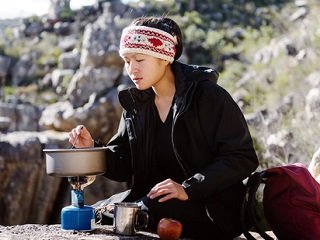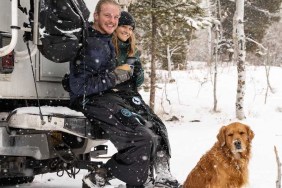 It’s hard to beat the excitement and beauty that nature possesses. There are things that some people will never experience unless they hit the trails. Not only that, but hiking is a great, unconventional way to get exercise without paying for a gym membership. All that fresh air and exercise can build an appetite and you’ll need to recharge after a long day on the trail.
It’s hard to beat the excitement and beauty that nature possesses. There are things that some people will never experience unless they hit the trails. Not only that, but hiking is a great, unconventional way to get exercise without paying for a gym membership. All that fresh air and exercise can build an appetite and you’ll need to recharge after a long day on the trail.
Some think that you forego taste when you camp, but there’s more than campground staples like hot dogs and s’mores to choose from when you’re camping. In fact, anything you can cook at home, you can cook outside. All you need is some foresight and some equipment. Today we’ll take a look at the three ways you can cook dinner at your campsite.
Campfire
Campfire cooking is pretty much synonymous with camping. Plus, telling stories around the fire while enjoying s’mores or banana boats are great ways to wind down and relax after a busy day. If fires are permitted where you’re camping, be sure to contain them in established fire pits and keep them small by using smaller sticks instead of huge logs. Also, always put out your fire completely by dousing it with water or covering with sand before going to sleep or leaving your campsite. You don’t have to limit yourself to hot dogs when you’re cooking over a campfire, though. Many delicious recipes can be prepared ahead of time in foil packs and placed near the embers of the fire to cook.
Dehydrated Meals
Another popular option is prepackaged dehydrated meals. Brands like Backpacker’s Pantry offer a large variety of foods, ranging from snacks for one to complete two-person meals. Many backpackers like this option because it’s easy, lightweight, and doesn’t require you to carry anything besides a pot and some silverware. Just add hot water and eat the meal right out of the bag.
Camp Stoves
Camp stoves, while potentially bulky for most backcountry travelers’ tastes, are actually great ways to cook while camping if you have the room. You can find quality stoves from brands like Primus and JetBoil that, when combined with the right cookware, can provide you with just as many meal options as your kitchen, just on a smaller scale. With a camp stove, you’ll want to make sure you also bring enough plates, bowls, mugs, and utensils, as well as extra fuel for the stove.
As you can see, there really isn’t any excuse for a poor trail diet. You’re really only limited by your wallet and carrying capacity. Whether it’s simple classics over the campfire or complete meals on a stove, you can still eat like kings and queens this season if you prepare ahead of time.








